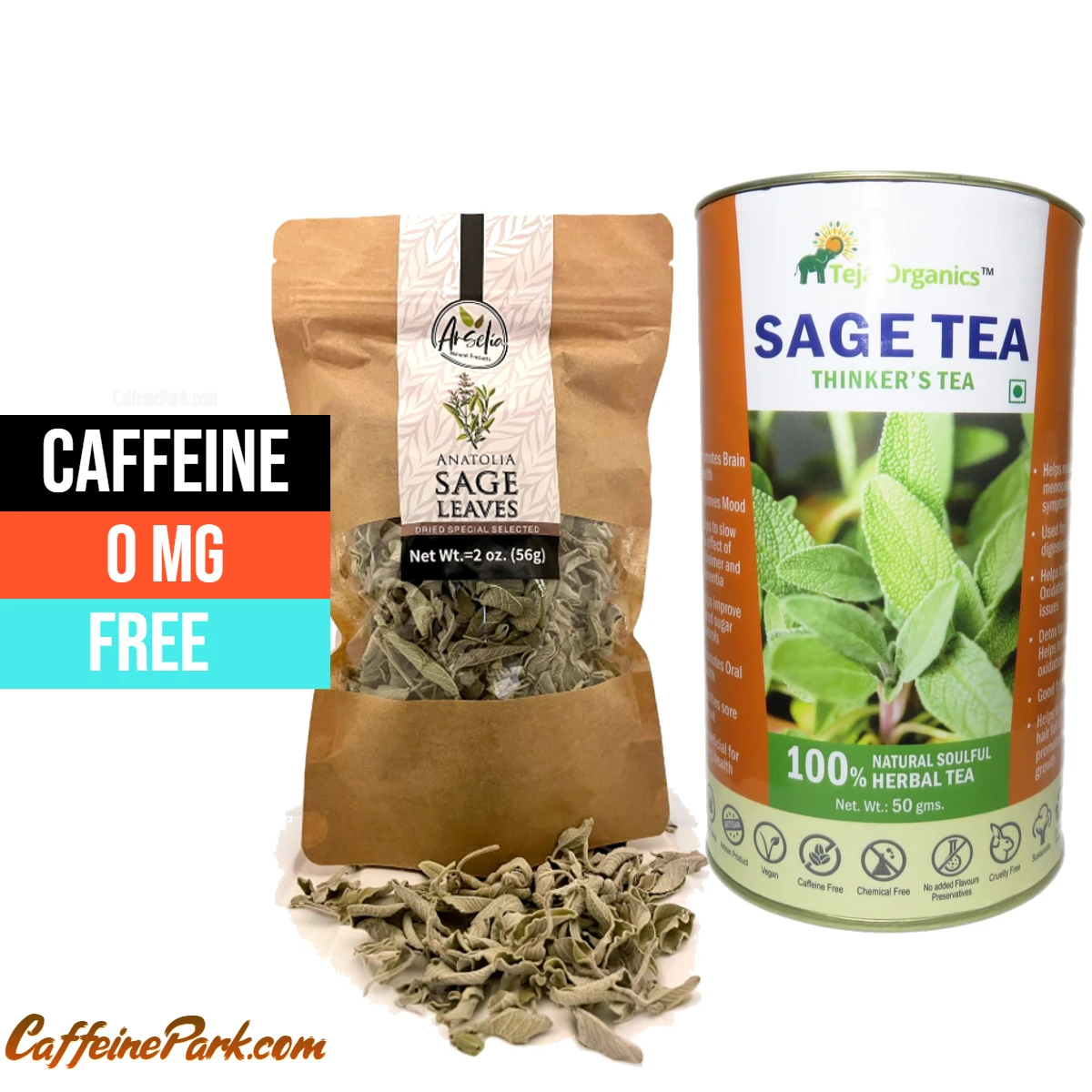Sage Tea Caffeine Content

Sage tea is a popular herbal tea that has been enjoyed for its medicinal properties and delicious taste for centuries. It is made by steeping the leaves of the sage plant in hot water and is often consumed for its calming and soothing effects.
But one question that many people have about sage tea is whether it contains caffeine. In this article, we’ll explore the caffeine content of sage tea and answer some common questions about this popular herbal beverage.
What is Sage Tea?
Sage tea is a type of herbal tea made from the leaves of the sage plant, which is scientifically known as Salvia officinalis. This plant is native to the Mediterranean region but is now grown all over the world.
The leaves of the sage plant are rich in antioxidants, which have been shown to have a number of health benefits. Sage tea is often consumed for its anti-inflammatory properties and has also been found to have antibacterial and antifungal properties.
Sage tea is also known for its calming and soothing effects. It contains compounds that are believed to have a mild sedative effect, making it a popular choice for those who struggle with anxiety or insomnia.
Does Sage Tea Contain Caffeine?
One of the most common questions people have about sage tea is whether it contains caffeine. The answer is no, sage tea is naturally caffeine-free.
This can make it a great choice for those who are sensitive to caffeine, or who are looking for a caffeine-free alternative to traditional tea or coffee.
However, it’s important to note that some commercially available sage teas may contain caffeine if they have been blended with other types of tea or herbs that do contain caffeine. So if you are specifically looking for a caffeine-free sage tea, be sure to read the label carefully to ensure that it does not contain any added caffeine.
Benefits of Drinking Sage Tea
Sage tea has been enjoyed for its medicinal properties for centuries, and there are a number of potential health benefits associated with this herbal beverage.
May Help Reduce Inflammation
Sage tea is rich in antioxidants, which have been shown to have anti-inflammatory properties. This means that consuming sage tea may help to reduce inflammation in the body, which has been linked to a number of chronic health conditions, including heart disease, cancer, and arthritis.
May Improve Brain Function
Sage has been traditionally used as a natural remedy for a variety of cognitive problems, including memory loss and poor concentration. Studies have found that consuming sage tea may help to improve cognitive function, particularly in older adults.
May Have Antimicrobial Properties
Sage tea has been found to have antibacterial and antifungal properties, which may help to protect against a range of infections. This is because the compounds found in sage have been shown to inhibit the growth of harmful bacteria and fungi.
May Promote Relaxation
Sage tea is known for its calming and soothing effects, which can help to promote relaxation and reduce feelings of anxiety and stress. This is because sage contains compounds that have a mild sedative effect, which can help to promote relaxation and improve sleep quality.
How to Make Sage Tea
Making sage tea is easy and can be done using fresh or dried sage leaves. Here’s a simple recipe to get you started:
Ingredients:
- 1 tablespoon fresh sage leaves (or 1 teaspoon dried sage leaves)
- 1 cup boiling water
Instructions:
- Rinse the sage leaves and place them in a teapot or tea infuser.
- Pour boiling water over the sage leaves and let steep for 5-10 minutes.
- Strain the tea and serve hot.
You can also add honey, lemon, or other herbs to customize the flavor of your sage tea.
Final Thoughts
Sage tea is a delicious and healthy herbal beverage that is naturally caffeine-free, making it a great choice for those who are looking for a caffeine-free alternative to traditional tea or coffee. It’s rich in antioxidants and has been shown to have a number of potential health benefits, including reducing inflammation, improving brain function, and promoting relaxation.
Making sage tea at home is easy and requires only a few simple ingredients. Whether you enjoy it for its taste or its health benefits, sage tea is a great addition to any tea lover’s repertoire.
If you’re interested in trying sage tea for yourself, you can find it at most health food stores or online. Just be sure to read the label carefully to ensure that it’s caffeine-free if that’s what you’re looking for.
Overall, sage tea is a delicious and healthy beverage that’s worth trying if you haven’t already. Whether you enjoy it for its taste or its health benefits, it’s sure to become a new favorite in your tea collection.
Alternative to Sage Tea
If you’re looking for an alternative to sage tea, there are many other herbal teas that you can try. Here are a few options:
- Chamomile tea: Chamomile tea is a popular herbal tea that’s known for its calming and relaxing properties. It’s also naturally caffeine-free and has a mild, slightly sweet taste.
- Peppermint tea: Peppermint tea is another popular herbal tea that’s caffeine-free. It has a refreshing, minty flavor and is often used to soothe digestive issues.
- Rooibos tea: Rooibos tea is a South African herbal tea that’s naturally caffeine-free. It has a slightly sweet, nutty flavor and is rich in antioxidants.
- Lemon balm tea: Lemon balm tea is made from the leaves of the lemon balm plant and has a light, lemony flavor. It’s often used to promote relaxation and reduce stress.
- Ginger tea: Ginger tea is made from fresh ginger root and has a spicy, warming flavor. It’s often used to soothe digestive issues and reduce inflammation.
These are just a few of the many herbal teas that are available. Experiment with different flavors and find the ones that you enjoy the most. And remember, herbal teas are a great way to enjoy a warm, comforting beverage without caffeine.
FAQs
Yes, sage tea is naturally caffeine-free. It does not contain any caffeine unless it has been blended with other types of tea or herbs that do contain caffeine.
The amount of caffeine in sage tea will vary depending on the types of tea or herbs that it has been blended with. Be sure to read the label carefully to determine the caffeine content.
Yes, sage tea is a great choice for people who are sensitive to caffeine. It’s a natural, caffeine-free beverage that can be enjoyed without the jitters or other side effects associated with caffeine.
Yes, you can drink sage tea before bed. In fact, its calming and soothing effects may help to promote relaxation and improve sleep quality.
In addition to its anti-inflammatory properties, sage tea has been found to have antimicrobial properties, improve cognitive function, and promote relaxation. It’s also rich in antioxidants, which have been shown to have a number of health benefits.
Read More:





